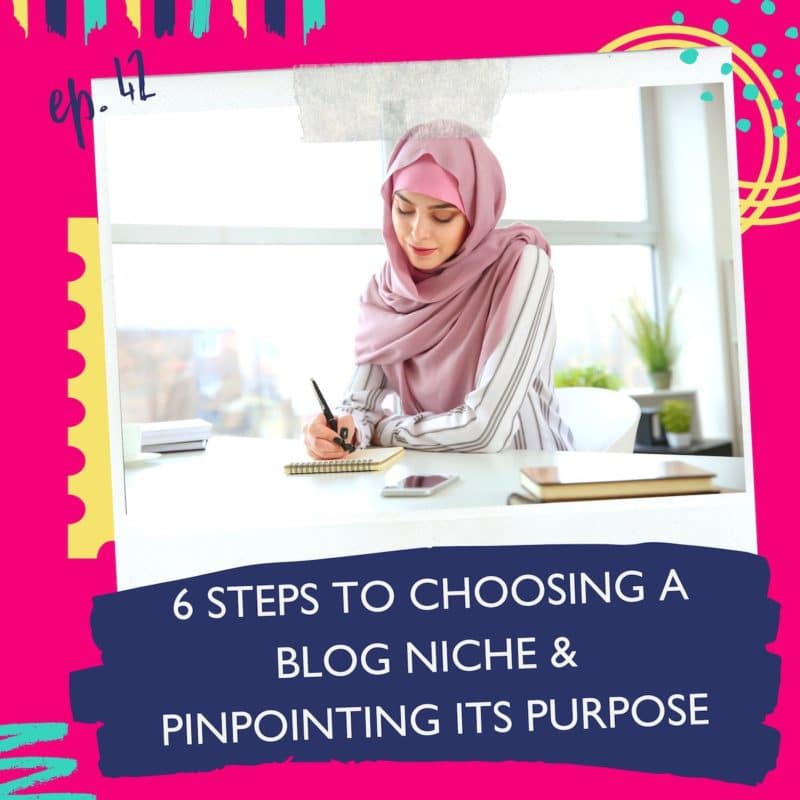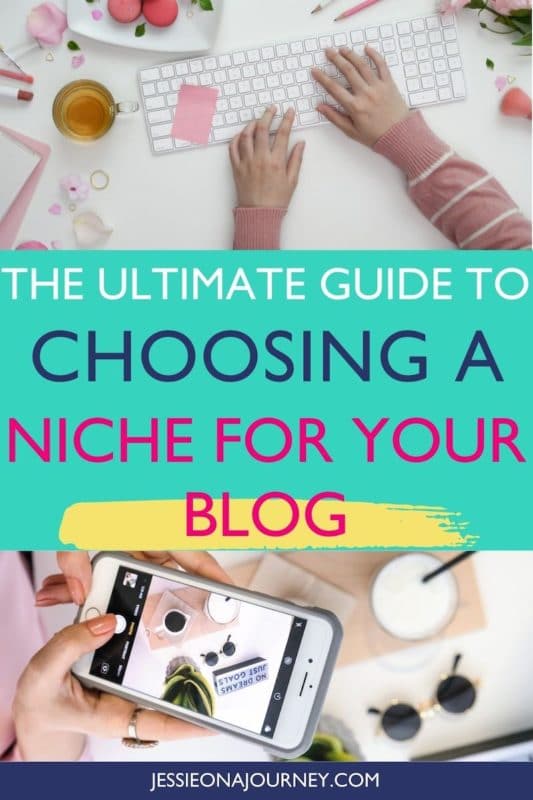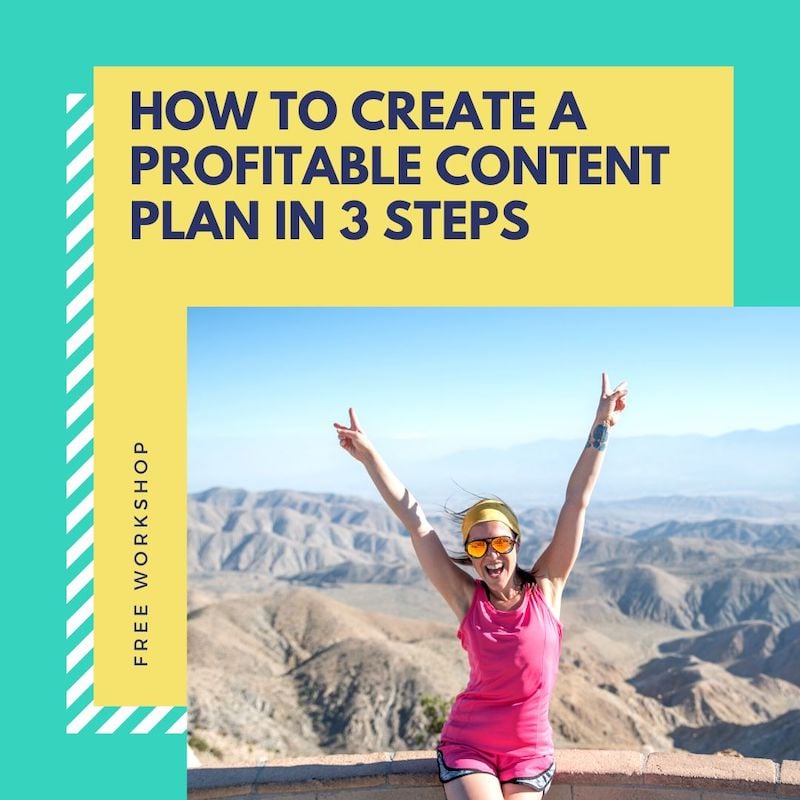6 Steps To Choosing A Blog Niche & Pinpointing Its Purpose [Ep. 42]
Need help choosing a blog niche and pinpointing its purpose?
Then you’re in the right place, as that’s exactly what we’ll be covering in this episode of The Profitable Travel Blogger Podcast!
More specifically, you’ll learn:
- How to select a niche for blogging
- Tips for infusing your core values into your blog topic
- Journal prompts for creating an authentic blog brand
- Advice on monetizing your blog niche
- And more!
By the end, you’ll have created an authentic and profitable blog brand!
On that note, let’s dive into the episode.
Disclosure: This episode + post on how to choose a blog topic contains affiliate links to trusted partners I think you’ll love!
Choosing A Blog Niche & Pinpointing Its Purpose [Podcast Episode Audio]
Click here to listen on Apple Podcasts/iTunes
Click here to listen on Spotify
Click here to listen on TuneIn
Invite: Free Content Planning Workshop
Want to learn how to create a content plan and choose a blog niche? Make sure to grab your seat in my free workshop: How To Create A Profitable Content Plan In 3 Steps.
By the end of our hour together, you’ll understand how to:
•Overcome myths related to monetizing a blog that may be holding you back
•Strategically choose a niche with high traffic & earning potential
•Create an SEO-friendly site structure to help your blog posts rank in search results
•Craft a strategic content plan that leads to increased traffic & income
•Find keywords you can actually rank for
•Increase your passive affiliate income through your content
•And more!
Bonus: Those who stay until the end will get a copy of my “41 Clever Ways To Monetize Your Travel Blog (With Examples) PDF!” This is a fan-favorite for those who want to monetize quicker!
Click here to grab your free seat in the workshop.

How To Choose A Blog Niche [Episode Transcript]
If you have an established or growing business, a blog offers a great way to attract new potential clients and increase blog traffic as well as nurture your existing customers through valuable free content.
But, what if you want to start a blog as a business? How do you determine what the purpose of your blog should be if you want to blog full-time?
That is exactly what we’ll be covering in this episode! By the end, you’ll have a strategy for not only determining your niche, but also diving deeper to build an intentional brand that helps a community of people — and a blog content plan to go with it.
Now before we dive into the strategy, I want to direct your attention to my free Travel Blogger Resource Library.
Inside you’ll snag access to 55+ resources from cheat sheets to workbooks to workshops to video tutorials that can help truly turn your blog into a profitable business. In fact, the library includes in-depth workbooks on creating a profitable blog brand, content strategy, business plan, and more!
I’m all about implementation and I really want to make sure you don’t just listen to the episode and forget about it, but that you actually use what I share to make your blogging life easier.
Feel free to even pause this episode to go grab those resources. You back? Then let’s dive in.
A Quick Note On This Blog Niche Strategy
While I’ve laid out this episode into steps, we’re all unique individuals, and so someone’s step #1 may fit better as someone else’s step #3.
For that reason, I recommend listening to the entire episode once, creating your order, and then re-listening to it with a journal and a pen to dive deep into the action steps.
Additionally, I recommend going through all of the steps before buying your domain so that you can have your purposeful blog mapped out before spending any money.
Okay, so let’s chat about…
Step #1: Pinpoint your profitable blog niche.
This will be the longest section of the strategy. If you already know your blog niche and want to get into branding your blog, I recommend skipping to step #2.
Now let’s talk for a second about why determining a blog niche is important — and how it can benefit you to niche down and get specific.
First of all, having a specific niche makes it clear who you help and how. This not only makes it clear to your website visitors who your content is meant for, but it makes it way easier to pinpoint what products to create and what affiliate partners to work with since you’ll have been nurturing your audience around a certain topic.
For instance, if your niche is solo female travel and you cover safety frequently, you’ll likely see great conversions promoting, say, pickpocket-proof clothing.
However, if you cover general travel, fashion, beauty, and recipes, it won’t be so simple to determine what you should actually promote.
Moreover, having a specific niche makes it easier to profitably work with brands on paid campaigns — even if you have a small audience. This is because even if the audience is small, it’s specific and targeted.
Just picture a brand that sells hiking gear. If your blog is all about hiking, even if you have a small audience it will still be the audience that brand wants to get in front of — vs a big blogger covering general travel who may have only a handful of hikers in their readership.
Also, the more you cover a topic on your blog, the easier it is to rank for that topic in organic Google search, as Google will start to see you as an authority in it.
For instance, I live in New York and cover New York travel very frequently. Because of this, I’m often able to rank on the first page of Google for those posts — even beating out blogs that are bigger than me.
Finally, if you’re wondering how to write articles fast, having a specific niche can help, as you won’t waste time wondering what to cover.
Okay, you get it. Choosing a blog niche can be beneficial. But, what if you’re not sure what your niche should be?
I recommend starting with a list of your skills and areas of expertise as well as what you’re passionate about.
Don’t think too hard at this point — just get all of your ideas onto a piece of paper. This is really just to give you a starting point.
If you’re having trouble making this list, consider what questions people come to you with. You might even ask some family and friends what they see you as an expert in.
Once your list is created, consider what topics you could realistically write about indefinitely — and that you’d enjoy writing about.
For example, you might be really savvy with finances, but you’d have a lot more fun writing about sustainable travel. Or, you might be excited about writing while you study abroad in Italy; however, that trip has a finite time frame. Will your blog make sense once it ends?
The other thing to make sure of is that the topic is something you could come up with blog post ideas for. In fact, you might challenge yourself to come up with, say, a year’s worth of blog post topics.
If you’re publishing once per week, this would equate to 52 of them. If the first 10 come easy, but after that it starts to feel monotonous or the ideas don’t flow easily, you might choose a different topic.
Along with blog post ideas, start to think about how you’ll eventually make money — or, better yet, how you’ll monetize your blog from day one — particularly through creating physical and digital products to sell.
If one topic brings ideas for creating online courses, books, and paid experiences, and the other doesn’t, that can give you a good indication which niche would have the most longevity.
In the end, if you’re stuck between two or three categories, consider if you can combine them in a meaningful way, or give yourself a timeframe to test them out and see which sticks.
Step #2: Spend time journaling about your blog niche to determine recurring themes.
You can start with a simple question: “What do you love about your niche?”
Don’t make this a one or two sentence answer, but really try to fill up at least one full page. If you get stuck, just keep asking why and dig into how what you’re writing makes you feel.
For instance, when journaling about my blog niche of travel, one thing I wrote about why I love travel is that when we travel, we remember what it is to feel curious and every day can feel like an adventure.
Step #3: Consider your core values.
These are the values that will guide how you show up for your community and how you run your business. When thinking about this, consider the personal values you hold in life.
- What is important to you on a regular basis? For instance, maybe you want to use your platform for good.
- Also, think about people you admire or follow and why?
You might even create an Instagram collection where you save posts that resonate with you, and then once you have a bunch saved you can look them over to determine recurring messaging.
To make this clear, I’ll use my own blog, Jessie on a Journey, as an example. One of my core values is “creativity” — as in, going beyond blueprints and society’s plan to pave your own path in life. It’s the reason why my hashtag for Jessie on a Journey is #BeyondTheGuidebook.
On that note, we’re on to…
Step #4: Add in your inherent gifts and talents.
While before you were considering your gifts and talents to determine a specific blog niche to cover, it’s also wise to build these into your brand.
These aren’t necessarily things you write about, but more ways you show up or ways you make other people feel.
For example, a few of my own inherent gifts that I weave into my brand include being relatable, creative storytelling, and being empowering.
It’s helpful to also consider how you’ll weave these into your blog brand. For instance, I often say things like “hey, friend!” in my content, I avoid having a picture-perfect Instagram grid, and I share my own mistakes. These are all ways I can be more relatable to my audience.
Pro tip:
While doing this exercise, you may uncover a talent that could be fun to weave into your brand.
For example, if you’re an artist who loves to travel, can you draw or paint the places you visit or create fun art maps to go along with your itineraries? Or, if you’re a gifted musician, maybe you write original songs about the places you visit.
Step #5: Get clear on your blogging goals.
Now before putting anything live, you really want to make sure you’re clear on what your goals are for your blog. A few journal prompts for you here include:
- Why are you starting a blog in the first place? For instance, to empower women to confidently travel solo.
- Who do you want to help and how? By the way, I love the template “I help [group of people] do [how you help]”
- What does your dream life look like, and how can your blog help you achieve it? For example, maybe you dream of leading experiential women-only tours around the world and your travel blog is a way to increase your expertise in this niche and grow an audience around it.
- What do you want to achieve with your blog? While you may not feel ready to launch a product right away, it’s a good idea to spend some time daydreaming about what you ultimately want to put out into the world that can also be profitable. For now, you can say something like “I want to help 10,000 women feel confident traveling solo” or “I want to help make sustainable tourism mainstream” and add in products that further fulfill this.
This bring us to…
Step #6: Create a short and long bio.
For so long, whenever someone would ask me for a bio about my blog, it would take me an hour to write because I wasn’t clear on my purpose and messaging.
Having a bio is a great way to tell others what you do and why they should read, follow, and subscribe — but, I also find having a bio to be a great reference for yourself as the blogger.
Before you write a blog post, publish a social share, send an email, or create a product, you can refer to your bio and see if it aligns.
Personally, I find it helpful to pinpoint three key themes and try to include them in a one-sentence bio, as well as a bio that’s about three sentences.
For example, my one-sentence bio for Jessie on a Journey is “I am a conscious solo female travel blogger who shares real-talk + resources for exploring the world — and experiencing life — #BeyondTheGuidebook.”
With that one sentence, you know who I am, my values, and what I share. For instance, the choice of using the term “real-talk” was meant to show that I’m relatable, honest, and authentic.
One Final Tip For Choosing A Blog Niche & Brand
Now, I have one final tip for you before we end this episode. Often, it is difficult to pinpoint your blog’s brand and flesh out it’s purpose on your own.
I actually worked with a branding coach last year, and it was a really transformative experience. If you can’t afford one-on-one help, consider asking a friend or another blogger if you can bounce ideas off of them.
If you’re in the travel niche, I actually have a free Travel Creator Community Facebook group if you’d like to find potential collaborators.
Alright, now I hope you enjoyed this episode. I hope you feel inspired and empowered to find your blog’s purpose.
Don’t forget to grab access to the free travel blogging resource library. There are a ton of resources in there on growing your community and increasing your blogging profits.
And of course, make sure to subscribe so you don’t miss future episodes sharing these bite-sized strategies for bloggers who want to turn their blogs into profitable full-time businesses.
Happy blogging!
Define Your Profitable Blog Brand With These Helpful Past Episodes:
How To Create A Profitable Blog Brand
How Niching Down Can Help You Grow & Monetize Your Blog
How To Come Up With Blog Post Ideas People Actually Read
12-Step Content Creation Checklist For Bloggers
7-Step Blog Post Promotion Checklist – Trello Board Included!
Use This Blog Content Planner Template To Make A Blogging Calendar
Create Your Travel Blog Business Plan
How To Map Out & Crush Your Blogging Goals
How To Create A Free Resource Library That Grows Your Email List
How To Find Niche Keywords That Drive Traffic With Competitor Research
Connect With The Profitable Travel Blogger Podcast
Stay In The Loop
Do you want to get notified when new episodes publish?
Then make sure to opt-in for podcast email notifications sent to your inbox!
You can do that by clicking here.
Subscribe + Review (To Win A Prize!)
Love learning new blogging strategies to help grow your website traffic, community, and income?
Click here to subscribe on iTunes to be notified when new episodes publish.
I’d also be extremely grateful if you’d leave a review right here and let me know your favorite part of the episode or a takeaway you walked away with. By leaving a review, you help the show be seen by more people, helping the episodes to have a greater impact.
Bonus:
Each month, I’ll be choosing one reviewer at random to win a FREE seat inside one of my masterclasses.
Winners can choose from:
- How To Grow Your Blogging Income Through Facebook Ads
- How To Land Paid Press Trips As A Travel Blogger
- How To Make Money (Fast) With Affiliate Marketing
- How To Start A Tour Company In Your Own Backyard
- How To Start A Blog, Grow An Audience & Make Money
- Build Your Blogging Profit Plan Masterclass
Winners will be chosen at random from the reviews and will be notified via email, so make sure to send me — jessie (at) jessieonajourney dot) com — your email address so I have it.
Do you have any tips for choosing a blog niche to add?
Enjoyed this episode on choosing a blog niche and creating a brand you’re passionate about? Pin it for later!




